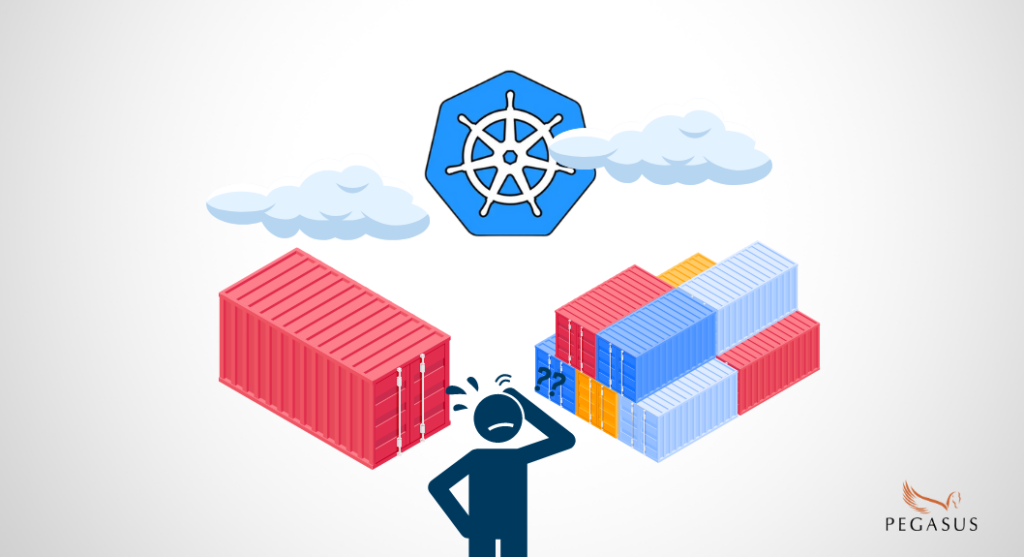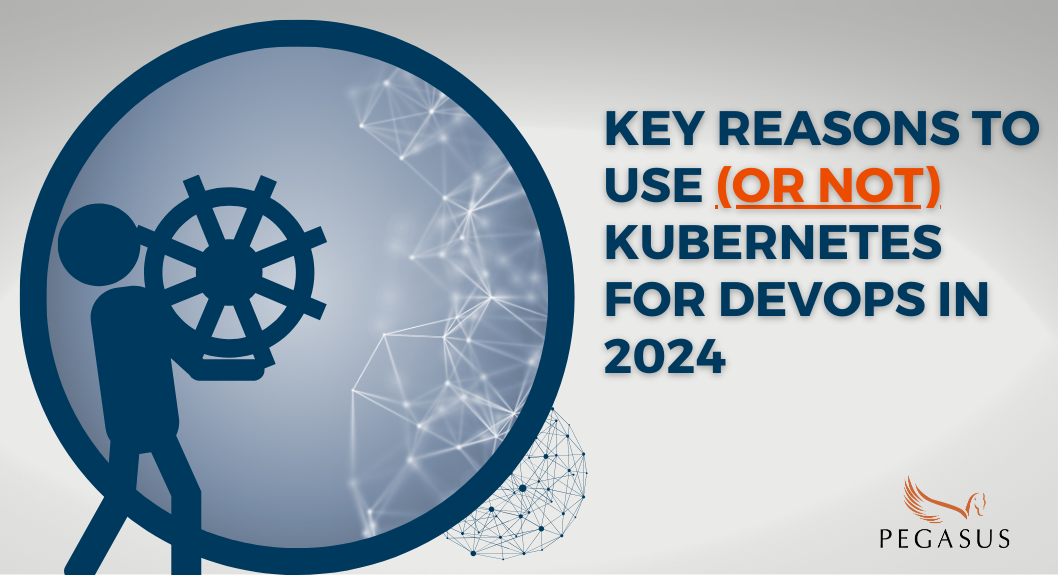Explore the definitive guide to understand the pivotal the reasons for or against using Kubernetes in your development environments in 2024. Unveil its advantages, potential drawbacks, and crucial FAQs for a well-informed decision.
Kubernetes is a top container tool but still, it isn’t widely used in development due to its complexity. But overlooking it means missing its benefits. Here we explore the pros and cons of using Kubernetes. We’ll highlight when it’s suitable and ways to simplify deployment without complexity.

Kubernetes can significantly enhance the development environment. Let’s see how.
What Makes an Effective DevOps Environment?
Developing an effective environment means aligning it with production intricacies like infrastructure and CI/CD setups. However, replicating production in development can be challenging and may slow things down due to added steps and infrastructure needs.
Fast collaboration and quicker release cycles in an ideal setup might stray from established production workflows. This creates challenges in maintaining standardized processes across environments while aiming for agility.
Kubernetes can significantly enhance the development environment.
Advantages of Kubernetes in DevOps
1. Scaling Apps Easily
Kubernetes’ automatic scaling capabilities are pivotal in development environments. It makes sure applications handle traffic changes well in development, testing, and deployment by adjusting resources as needed. This adaptability boosts app performance and helps manage costs. It optimizes resources and avoids waste, crucial in cloud-native setups.
2. Keeping Apps Consistent Everywhere
Kubernetes offers a consistent environment across diverse setups. This consistency streamlines collaboration between development teams by abstracting underlying infrastructure complexities. Moreover, Kubernetes’ portability allows for the seamless movement of applications across environments, ensuring compatibility across multi-cloud or hybrid setups.
This portability proves invaluable during development and testing, facilitating adaptability and standardization of applications across various deployment scenarios.
3. Speeding Up App Deployments
Kubernetes revolutionizes deployment practices by automating and streamlining the entire process. Through its automated deployment pipelines, it facilitates faster and more reliable releases by reducing manual intervention and minimizing human-induced errors. This automation fosters a culture of continuous integration and deployment, enabling development teams to iterate swiftly while ensuring stability in application rollouts. Consequently, Kubernetes’ streamlined deployment mechanisms empower developers to focus more on innovation and less on the complexities of deployment management, enhancing overall development efficiency.
4. Ensuring App Reliability
One of Kubernetes’ standout features is its robustness in ensuring application resilience and high availability. Its fault-tolerant architecture efficiently manages application instances across clusters, minimizing service disruptions during failures or system issues. Notably, Kubernetes’ self-healing capabilities automatically recover and redistribute workloads, ensuring consistent service availability and mitigating downtime. This resilience extends from node failures to application-level issues, minimizing interruptions and enhancing the overall reliability of applications in the development lifecycle.
Challenges in Adopting Kubernetes
1. Learning Curve and Complexity
Kubernetes can be tough to learn. Its complex structure and various concepts like Pods, Services, and Deployments create a steep learning curve. Teams require time and resources to grasp these concepts fully. The complexity might impact initial productivity and necessitate additional training or external expertise. However, once understood, Kubernetes streamlines operations and offers extensive scalability and flexibility.
2. Operational Skill Requirements
Efficiently managing Kubernetes clusters demands specialized skills in tasks like cluster setup, monitoring, scaling, high availability maintenance, and robust troubleshooting. Expertise in Kubernetes administration, containerization (especially Docker), networking, security practices, monitoring tools, scripting, and cloud infrastructure is essential. Striking a balance between development responsibilities and cluster management requires individuals proficient in both coding and Kubernetes management. Investing in training or hiring personnel with these skills ensures streamlined cluster operations, optimizing the benefits Kubernetes can offer.
3. Resource Suitability Assessment
Kubernetes can be resource-intensive, particularly for smaller projects or applications with limited scalability needs. Implementing Kubernetes in such cases might introduce unnecessary complexity and overhead. Evaluating the project’s requirements thoroughly before adopting Kubernetes is crucial. It’s crucial to weigh the pros of scalability and fault tolerance against Kubernetes’ added complexity. This helps decide if it’s the right fit for your project.
When to Use Kubernetes
Kubernetes may not always be the ideal choice for your application by default.
You should NOT use Kubernetes if:
- If you have a small engineering team and minimal need for scalability.
- If your application is relatively simple, doesn’t require high availability, and isn’t performance-intensive.
- If your application is a traditional monolith and doesn’t require an upgrade.
- Kubernetes is complex and difficult to manage without good tools and even selecting the right tools can be quite time-consuming
- Kubernetes has a steep learning curve
- For small deployments, Kubernetes will consume quite a bit of computing resources (relative to the application being managed)
- If an organization already has a well-established infrastructure that doesn’t align with Kubernetes, the migration effort might not be justified
- Some workloads, especially those with low resource requirements, might not benefit significantly from the features Kubernetes offers. Simpler solutions may be more appropriate.
Kubernetes should be your TOP choice if:
- You are in the process of application modernization, transitioning from a monolith to a microservices-based architecture.
- If you’re seeking rapid growth and scalability for your solution.
- If your containerized application demands high availability and fault tolerance.
- Kubernetes provides built-in service discovery and load balancing, making it easier to manage communication between microservices in a distributed application
- Kubernetes offers a high level of abstraction, making applications portable across different infrastructure environments, whether on-premises or in the cloud.
- Kubernetes facilitates automated application deployment with controlled rollouts and rollbacks, reducing the risk of introducing errors during updates.
How Pegasus Can Help Benefit from Kubernetes
At Pegasus, we specialize in simplifying Kubernetes integration for your development environment. Our seasoned experts ensure a seamless transition, mitigating complexities, and optimizing your development processes through Kubernetes. We offer tailored solutions and multilingual support, catering to diverse teams and regions, guaranteeing clear communication and comprehensive assistance throughout the integration journey.
Ready to harness the power of Kubernetes? Book a consultation with us today!
Let Pegasus empower your development environment with streamlined Kubernetes integration – schedule a consultation to explore the possibilities.
Frequently Asked Questions (FAQs)
- What are the main advantages of Kubernetes? It offers scalability, flexibility, automation, security, and cost-effectiveness, among other benefits.
- Is Kubernetes suitable for small-scale projects? For smaller projects, the learning curve and upkeep might outweigh the benefits, even though it’s adaptable.
- How does Kubernetes affect DevOps workflows? Kubernetes streamlines processes but requires adaptation in existing workflows for optimal utilization.
- Are there alternatives to Kubernetes? Yes, alternatives like Docker Swarm, Nomad, and OpenShift offer different features and trade-offs.
- How does Kubernetes impact infrastructure cost? Efficient resource management in K8s often leads to cost savings in the long run.
- What factors should one consider before adopting Kubernetes? Consider expertise, infrastructure compatibility, budget, and long-term resource commitments.



